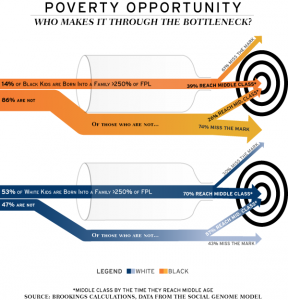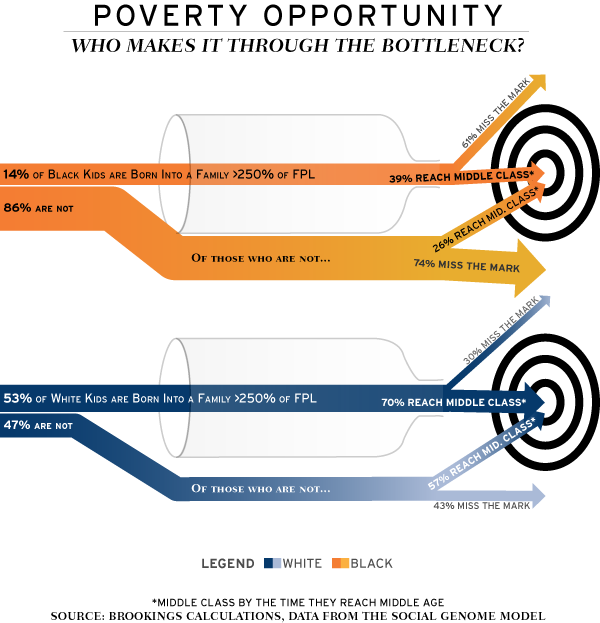New Book Spurs Debate on America’s Bottlenecks to Opportunity
 •
•
What are the essential steps in life we need to take in order to gain access to more opportunity?
On the path to upward mobility and economic security, there are several key steps a person must take. Perhaps the most critical is getting a healthy start to life as an infant and toddler, including access to a high-quality pre-kindergarten education that supports early cognitive development. Another important step – particularly in today’s increasingly competitive global economy – is graduating from high school and earning some form of post-secondary degree or credential.
More Americans are trying to move through these critical points than are successfully getting to the other side, where the best opportunities await. Our country has too many bottlenecks that are costing us the full benefit of our country’s talent.
Joseph Fishkin’s new book, Bottlenecks, A New Theory of Equal Opportunity, has led to an exchange of important ideas over how we expand access at these narrow points and create alternate paths that lead to economic advancement. Richard Reeves and his colleagues at the Brookings Institute have a number of posts considering the implications for Fiskin’s framework at pivotal life moments and how we can loosen these bottlenecks to expand economic and educational opportunity to more Americans.
What does this have to do with Opportunity Nation?
The Opportunity Index shows how the county and state where you live can cause bottlenecks because of major economic, educational and civic conditions that affect access to the American Dream. The Index has 16 indicators of opportunity including:
- Preschool enrollment
- On-time high school graduation
- Associate or higher education degree attainment
- Access to health care providers and healthy food
- Availability of banking institutions that allow for savings and asset-building
- Internet access
Opportunity Nation advances solutions to allow more Americans to move past these bottlenecks. We highlight the work of innovative partners preparing people to get through bottlenecks, like starting kindergarten ready to learn or being academically prepared for post-secondary education. It is equally important to feature how partners are helping Americans around bottlenecks, such as by training those who did completing college with skills that lead to economic stability and self-sufficiency.
Since earning educational and career qualifications can be a bottleneck, offering diverse opportunities to get them is vital. Partnerships between businesses, community colleges and nonprofit organizations can help get people through the bottleneck of employment. We also believe companies must play a major role in offering chances for employees to learn additional skills in order to get past bottlenecks within their career ladder.
On the national policy side, we pushed Congress to pass the Workforce Innovation and Opportunity Act, which affirms the importance of creating multiple pathways to good jobs and is now law. Modernizing career and technical education through the reauthorization of the Perkins Act would empower more students to take an alternate path to good jobs that avoids bottlenecks – financial or academic — that exist in our four-year degree systems.
One approach to loosening a bottleneck is identifying and clearing obstacles that have nothing to do with merits that frequently get people stuck. Andrew Kelly offers an example of unnecessarily complex financial aid forms and administrative bureaucracy that cause many low-income students with academic potential to not enroll in college. Our country’s relatively high cost of higher education is itself a bottleneck that demands change to help students get through this crucial point.
In what Fishkin calls a “plural opportunity structure,” we will see key indicators, such as our Index’s measure of “disconnected youth” — 16-24 year olds who are neither in school nor working — move in the right direction. Fishkin’s ideal society is less like a pyramid with only a lucky few at the top, and more like a spread-out city, full of many different streets and roads. Striving towards this goal helps us become a nation of equal access to opportunity and away from our current stagnation of social mobility.
All of us can consider what we are doing to help teens and young adults as they approach critical bottleneck moments. We can also join together to champion ways to become a country where more people pass through and around bottlenecks to launch successful lives and build thriving communities.









